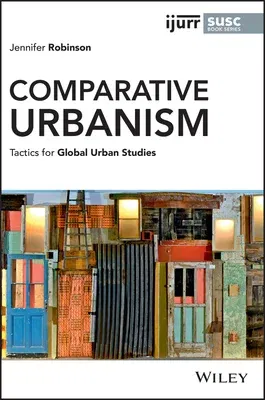COMPARATIVE URBANISM
'Comparative Urbanism fully transforms the scope and purpose of urban
studies today, distilling innovative conceptual and methodological
tools. The theoretical and empirical scope is astounding, enlightening,
emboldening. Robinson peels away conceptual labels that have anointed
some cities as paradigmatic and left others as mere copies. She
recalibrates overly used theoretical perspectives, resurrects forgotten
ones long in need of a dusting off, and brings to the fore those often
marginalised. Robinson's approach radically re-distributes who speaks
for the urban, and which urban conditions shape our theoretical
understandings. With Comparative Urbanism in our hands, we can start
the practice of urban studies anywhere and be relevant to any number of
elsewheres.'
Jane M. Jacobs, Professor of Urban Studies, Yale-NUS College,
Singapore
'How to think the multiplicity of urban realities at the same time,
across different times and rhythmic arrangements; how to move with the
emergences and stand-stills, with conceptualisations that do justice to
all things gathered under the name of the urban. How to imagine
comparatively amongst differences that remain different, individualised
outcomes, but yet exist in-common. No book has so carefully conducted a
specifically urban philosophy on these matters, capable of beginning and
ending anywhere.'
AbdouMaliq Simone, Senior Research Fellow, Urban Institute, University
of Sheffield
The rapid pace and changing nature of twenty-first century urbanisation
as well as the diversity of global urban experiences calls for new
theories and new methodologies in urban studies. In Comparative
Urbanism: Tactics for Global Urban Studies, Jennifer Robinson proposes
grounds for reformatting comparative urban practice and offers a wide
range of tactics for researching global urban experiences. The focus is
on inventing new concepts as well as revising existing approaches.
Inspired by postcolonial and decolonial critiques of urban studies she
advocates for an experimental comparative urbanism, open to learning
from different urban experiences and to expanding conversations amongst
urban scholars across the globe.
The book features a wealth of examples of comparative urban research,
concerned with many dimensions of urban life. A range of theoretical and
philosophical approaches ground an understanding of the radical
revisability and emergent nature of concepts of the urban. Advanced
students, urbanists and scholars will be prompted to compose comparisons
which trace the interconnected and relational character of the urban,
and to think with the variety of urban experiences and urbanisation
processes across the globe, to produce the new insights the twenty-first
century urban world demands.

